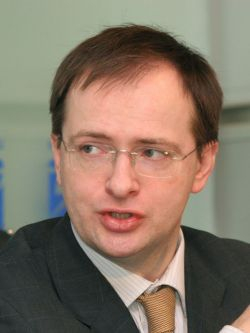
Medinsky
Medinsky, 41, one of the biggest surprises of the Cabinet unveiled Monday, is a senior member of the ruling United Russia party, and he replaces former diplomat Alexander Avdeyev at the Culture Ministry.
Accused of plagiarizing his doctoral dissertation in January, Medinsky has flirted with controversy for years. Suspicions have swirled that he used his chairmanship of the State Duma’s Culture Committee from 2003 to 2011 to promote his “Myths About Russia,” which includes titles such as “About Russian Alcoholism, Sloth and Cruelty” and “About Russian Slavery, Dirt and ‘Prison of the Nations.’”
The series — which was heavily advertised on the city's billboards and had a print run of 350,000 copies — later became the basis of his dissertation, which looked into how foreigners depicted Russia in the 15th to 17th centuries. Bloggers accused him of plagiarism in January — charges that he denied but which caused a fierce debate among scholars and other experts.
Medinsky believes “all foreigners who wrote bad things about Russia were foreign intelligence agents,” said Yulia Latynina, a talk show host and Moscow Times columnist who spoke with Medinsky on Ekho Moskvy radio last week, according to comments on her blog.
In one of his remarks related to culture, Medinsky complained that Josef “Stalin was good at ideology and brainwashing, but now everything is neglected.”
Notably, Medinsky has been a member of a presidential commission to counter attempts to falsify Russian history since 2010. The commission was created by then-President Dmitry Medvedev in 2009 to “counteract attempts to falsify history to the detriment of Russia’s interests.”
United Russia submitted Medinsky's candidacy for the ministerial post, Interfax reported, citing the party.
Pavel Rudnev, a theater critic, said Medinsky is “absolutely an unknown figure” in the artistic community, and that makes it hard to forecast his future role there.
“He is clearly a party man, which raises certain fears,” Rudnev said by telephone. “But he hasn't done anything for the field yet, which raises a slight hope.”
But prominent gallery owner Marat Gelman was less optimistic. “The Culture Ministry is turning into the propaganda ministry,” he said, according to Gazeta.ru.
Independent political analyst Andrei Piontkovsky agreed, calling Medinsky “a propaganda minister of the Goebbels type” in an interview with Kommersant FM radio. He compared his surprise appointment to last week's nomination of tank factory employee Igor Kholmanskikh as President Vladimir Putin's envoy to the Urals Federal District.
Medinsky, born in Soviet Ukraine on July 18, 1970, started his career at the Russian Embassy in Washington D.C. in 1991 and 1992 and later founded a PR agency. In the late 1990s, he headed the information policy department at the Tax Ministry, and from 2002 to 2004, he led United Russia's elections campaign in Moscow and headed the party’s local branch.
He is married. No immediate information was available about potential children.
A Message from The Moscow Times:
Dear readers,
We are facing unprecedented challenges. Russia's Prosecutor General's Office has designated The Moscow Times as an "undesirable" organization, criminalizing our work and putting our staff at risk of prosecution. This follows our earlier unjust labeling as a "foreign agent."
These actions are direct attempts to silence independent journalism in Russia. The authorities claim our work "discredits the decisions of the Russian leadership." We see things differently: we strive to provide accurate, unbiased reporting on Russia.
We, the journalists of The Moscow Times, refuse to be silenced. But to continue our work, we need your help.
Your support, no matter how small, makes a world of difference. If you can, please support us monthly starting from just $2. It's quick to set up, and every contribution makes a significant impact.
By supporting The Moscow Times, you're defending open, independent journalism in the face of repression. Thank you for standing with us.
Remind me later.





